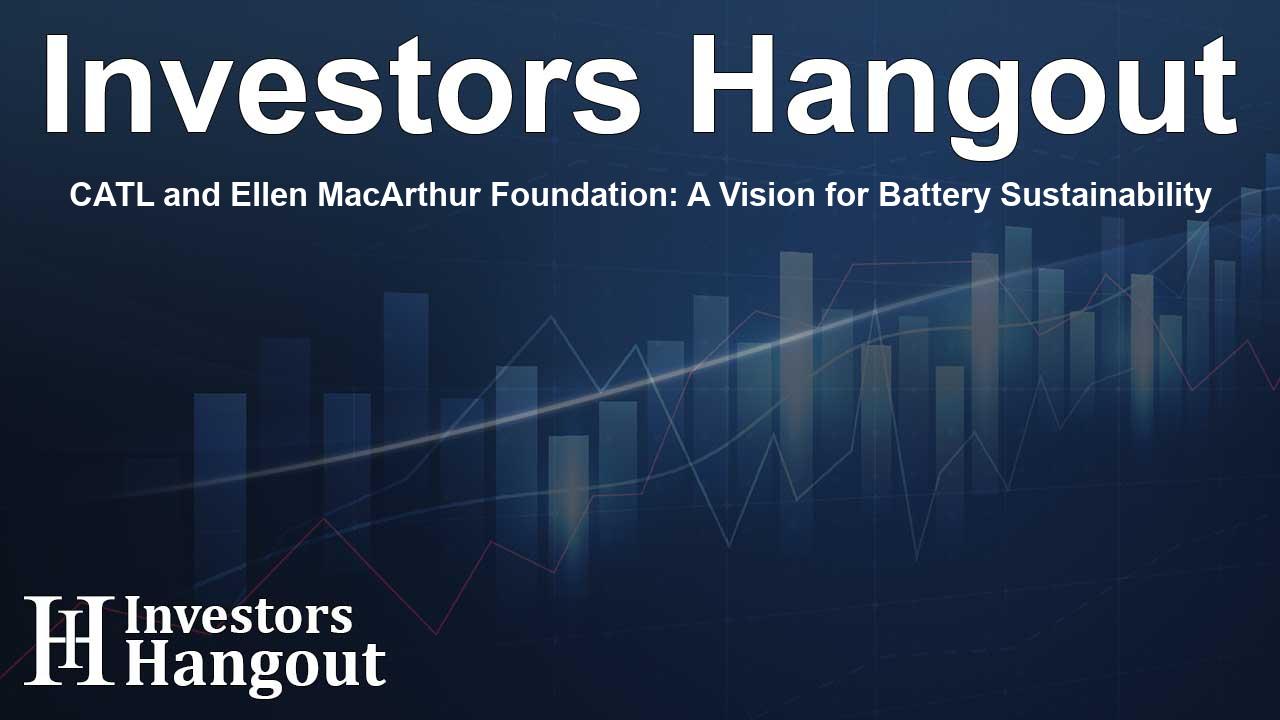CATL and Ellen MacArthur Foundation: A Vision for Battery Sustainability

Ambitious Collaboration Towards a Circular Battery Economy
During a significant event focused on climate action, CATL and the Ellen MacArthur Foundation came together to highlight their shared vision for a future centered around a circular battery economy. This partnership signifies a step towards transforming the global battery ecosystem, emphasizing the need to detach new battery production from virgin raw materials.
Guiding Principles for Transformation
CATL and the Ellen MacArthur Foundation aim to ensure that economic advancement is not reliant on extraction processes. The emphasis on innovation and collaboration is seen as essential for fostering stronger systems of sustainability. This ambition aligns with the growing recognition of the importance of the circular economy in addressing environmental concerns.
A Shared Ambition for Global Change
Jiang Li, a leading figure at CATL, articulated their long-term goals during a panel discussion. The ambition is to achieve a scenario where, in two decades, half of all battery production relies on recycled materials rather than newly mined resources. This goal sets a clear direction for stakeholders across various sectors to steer their efforts towards sustainable practices.
Economic Opportunities Arising from Circularity
The transition to a circular battery economy is projected to bring about numerous economic benefits. By 2040, forecasts suggest that the global battery recycling market could surpass RMB 1.2 trillion (approximately 165 billion USD). Furthermore, this evolution is expected to create millions of jobs, particularly in developing regions, thus contributing to economic growth and stability.
Four Key Principles to Drive Change
To effectively transition to a circular model, CATL has embraced four essential principles drawn from the Ellen MacArthur Foundation’s framework aimed at reshaping the battery value chain. These principles serve as a practical roadmap for the industry and initiate collaborative efforts among stakeholders.
Rethink Systems
Implementing a systemic approach is fundamental. By integrating circularity into every aspect of the battery lifecycle, the industry can significantly reduce waste and optimize resource utilization, thus promoting sustainability throughout the entire value chain.
Redesign Products
The journey toward circularity starts during the design phase. Batteries should be constructed for durability, disassembly, and multiple life cycles. By prioritizing modular designs, the longevity of batteries can be increased, allowing for enhanced recoverability and resource efficiency.
Rethink Business Models
Embracing innovative business models is crucial for aligning economic growth with resource sustainability. Transitioning from traditional ownership structures to service-based models can extend the utility of batteries and make them more accessible to consumers.
Recycle Materials
Efficient recycling practices are vital for closing the loop in the material lifecycle. A robust recycling infrastructure enables the recovery of valuable components from end-of-life batteries, minimizing reliance on newly sourced materials and bolstering a secure supply chain.
Pioneering Change Through the Global Energy Circularity Commitment (GECC)
CATL is actively promoting the Global Energy Circularity Commitment, an initiative designed to test and execute circular economy strategies in real-world scenarios. This platform invites collaboration among diverse stakeholders, fostering an exchange of insights that are critical for achieving impactful change throughout the industry.
Future Outlook
This collaboration signals the start of a new chapter in battery sustainability, focusing on transparency, innovation, and partnership across the global landscape. CATL and the Ellen MacArthur Foundation are committed to progressing this vision together, uniting with both public and private sectors to refine and implement their ambitious concepts.
As Jiang Li emphasized, building a circular battery system is not just a theoretical concept but a practical reality that will emerge through shared efforts and collaboration across various sectors. This ambitious stance serves as an invitation for global stakeholders to engage in collective action towards a more sustainable future.
Frequently Asked Questions
What is the main goal of the collaboration between CATL and the Ellen MacArthur Foundation?
The primary goal is to promote a circular battery economy, reducing reliance on virgin raw materials in battery production.
What are the four principles guiding this transformation?
The four principles are rethinking systems, redesigning products, rethinking business models, and recycling materials.
How will this ambition impact the job market?
This initiative is expected to generate millions of jobs, particularly in developing nations, as the battery recycling market grows.
What is the Global Energy Circularity Commitment (GECC)?
The GECC is a platform for stakeholders to collaborate on circular economy solutions and innovative practices within the battery industry.
When does CATL aim to decouple half of new battery production from virgin materials?
CATL aims to achieve this target within the next 20 years, marking a significant transition towards sustainability.
About The Author
Contact Kelly Martin privately here. Or send an email with ATTN: Kelly Martin as the subject to contact@investorshangout.com.
About Investors Hangout
Investors Hangout is a leading online stock forum for financial discussion and learning, offering a wide range of free tools and resources. It draws in traders of all levels, who exchange market knowledge, investigate trading tactics, and keep an eye on industry developments in real time. Featuring financial articles, stock message boards, quotes, charts, company profiles, and live news updates. Through cooperative learning and a wealth of informational resources, it helps users from novices creating their first portfolios to experts honing their techniques. Join Investors Hangout today: https://investorshangout.com/
The content of this article is based on factual, publicly available information and does not represent legal, financial, or investment advice. Investors Hangout does not offer financial advice, and the author is not a licensed financial advisor. Consult a qualified advisor before making any financial or investment decisions based on this article. This article should not be considered advice to purchase, sell, or hold any securities or other investments. If any of the material provided here is inaccurate, please contact us for corrections.
